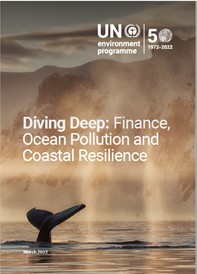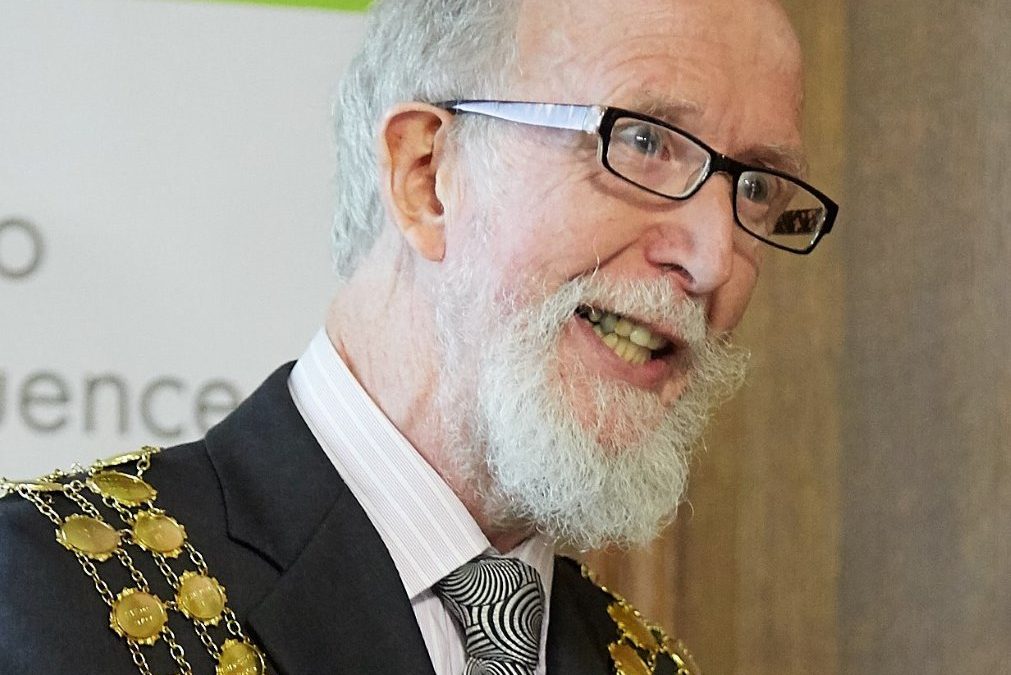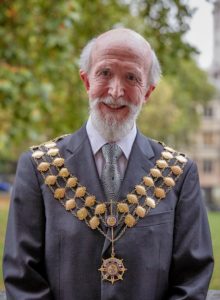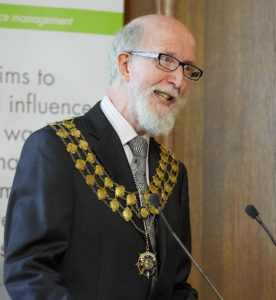3 March, 2022 | Publication, Resource and waste management

A key constraint to improving waste and resource management in many countries is a lack of access to investment finance. Extending waste collection to all and phasing out uncontrolled dumping and open burning in low-income countries would significantly cut the mass of plastics reaching the ocean. So the UNEP Finance Initiative publication Diving Deep, aimed at banks, insurers and institutional investors, is very welcome. Guidance is provided in the form of a science-based, actionable toolkit, to ensure that their investments, both in product manufacture and in waste management, encourage waste prevention and sound waste management, thus keeping plastics out of the oceans.
The promotional video and the document itself are worth looking at just for the wonderful images by world-renowned photographer Cristina Mittermeier of Sea Legacy. The guidance was prepared by WWF (led by Paula Chin) and RWA (led by Andy Whiteman). DCW played a small role as one of the reviewers.
29 January, 2021 | Publication, Resource and waste management
Professor David C. Wilson has contributed a chapter on the SDGs as drivers for change to The Routledge Handbook of Waste, Resources and the Circular Economy, edited by Terry Tudor and Cleber Dutra and published on 28 December 2020. This has been a subject on which DCW has worked extensively, as re-casting improved waste and resource management as an entry point for tackling multiple, high-profile sustainable development goals significantly strengthens the case for action.
Solid waste management is not one of the high-level SDGs; like the equally important topic of air pollution, it is rather cross-cutting, impacting on multiple SDGs. DCW links five global waste targets, as defined in UNEP and ISWA’s inaugural Global Waste Management Outlook, to the 17 SDGs. He shows strong and in principle measurable links to six SDGs, not only the ‘obvious’ SDG11 (sustainable cities) & indicator 11.6.1, and SDG12 (responsible consumption and production); but also SDG1 (end poverty), SDG 6 (clean water and sanitation); and SDG13 climate action and SDG14 life below water (preventing plastics reaching the oceans). Links to six other high priority SDGs are still direct but more difficult to measure (e.g. SDG8 decent work through sustainable job creation, and SDG2 zero hunger through reducing food waste). Indirect links can also be made to the remaining five SDGs, including difficult-to-tackle equality and governance issues.
The Handbook sits behind a paywall, with only the abstract of the chapter online. The accepted manuscript of the chapter can be downloaded here:
28 January, 2019 | Publication, Resource and waste management
Professor David C Wilson has been working for the last two years with the Rwandan academic Telesphore Kabera to apply the Wasteaware indicators to benchmark performance of the solid waste management (SWM) and recycling system in Kigali, the capital of Rwanda. Their results form the basis of a paper published today in the first ever open access issue of the long established ISWA peer-reviewed journal Waste Management & Research. The paper uses previously unpublished results from the Wasteaware database to compare Kigali’s performance with four other East African capital cities – Dar-es-Salaam, Kampala, Nairobi and Maputo.
http://worklife.wharton.upenn.edu/sildenafil-online/
The Wasteaware benchmark indicators grew out of work originally carried out for UN-Habitat’s Soild Waste Management in the World’s Cities (2010). They provide a standardised method to characterise the performance of a city’s SWM and recycling system across some 15 indicators, some quantitative and some qualitative, covering both waste generation, the physical aspects of waste and resource management, and various governance aspects. Results for the first 40 cities were used extensively in UNEP and ISWA’s inaugural Global Waste Management Outlook (2015). They are now being applied widely, both to characterise the baseline position in a city; to identify priority areas for improvement; and to monitor progress over time.
From this paper on East Africa, the stand-out result is the relatively high collection coverage achieved in two of the cities: in Maputo with extensive international technical assistance, and in Kigali using its own local resources. In both cases, governance factors are key. Kigali uses a public-private partnership (PPP), with exclusive franchises in 35 sectors being tendered every three years; households pay an affordable fee depending on their ability to pay (the service is free to the poorest category); 95% fee collection rates are achieved, partly through co-collection with charges for local security patrols, which is a service people value highly given the recent history of the country.
Another key priority to improve solid waste management across East Africa is to eliminate open dumping – only Kampala currently has an engineered disposal site. Recycling rates also need to be increased – only Nairobi currently has a good baseline to build on (30%). Common weaknesses include a lack of segregation at source; and of institutional capacity and of available and reliable waste data.
14 October, 2018 | Publication, Resource and waste management
According to the UNEP and ISWA’s Global Waste Management Outlook (GWMO), three billion people lack access to basic solid waste management (SWM) services; addressing this global waste crisis would not only vastly improve their lives but also halve the weight of plastics entering the oceans. Professor David C Wilson and Mike Webster of Wasteaid made the case earlier this year, in an open access editorial in the ISWA journal Waste Management & Research, for community waste management as a ‘bottom up’ approach, to run in parallel to traditional ‘top-down’ approaches led by donors and governments.
Community waste management aims to help local communities in the poorest countries, where the local authority often has no funds to provide a SWM service, to tackle the problem themselves through the resource value in the wastes. If, for example, food wastes or low-value plastics are kept separate, they can be turned into new, useful products. With simple tools and the right knowledge, people can become self-employed recycling entrepreneurs, providing a very valuable service for the health and wellbeing of their community, and the whole planet – as well as reducing poverty and creating sustainable livelihoods.
One of the gaps identified by the GWMO was for practical guidance on such low-cost ‘waste to wealth’ technologies which involve minimal capital investment and make products to sell in a local market. DCW’s CIWM Presidential Report aimed to plug that gap: Wasteaid prepared a Toolkit, including a dozen How-to-do-it Guides for simple technologies using organics and low-value plastics.
While preparing the Toolkit, we identified a parallel requirement, for the scientific underpinning of some of the technologies. This month sees the publication of a paper on optimising the technology for producing plastic bonded sand blocks, for use e.g. as paving slabs, from the low value LDPE film plastic, which is a major problem even in the least-developed countries. Our team at Imperial College London was led by Professor Chris Cheeseman, with the laboratory research carried out by Alexander Kumi-Larbi Jnr and Danladi Yunana. The technology was developed by another co-authors, Pierre Kamsouloum, a self-taught entrepreneur from the Cameroun.

18 October, 2017 | Awards, Resource and waste management

Professor David C Wilson following his inauguration in Westminster as 2017-18 CIWM President

Professor David C Wilson giving his inauguration speech as CIWM President 2017-18
https://samtech.edu/accutane-treating/
Professor David C. Wilson has been inaugurated as the 102nd President of CIWM, the UK and Irish professional body for resources and waste, at a reception in London. He described solid waste management as one of the key utilities and said that as public sector budgets continue to come under pressure, “we must not lose sight of where we have come from, that the service exists first and foremost to protect public health”. He highlighted the ‘global waste management emergency’, where 40% of the World’s population lacks this basic utility service. He also launched his Presidential report, Making Waste Work: A Toolkit, prepared by WasteAid UK and aimed at helping unserved communities in the least developed countries to help themselves, by developing self-sustaining businesses making useful products for the local market from the resource value in their waste.
Outlining the importance of legislation in the substantial progress that has been made in the sustainable and safe management of waste since the early 1970s, Professor Wilson added that there can be no softening of the regulatory framework. “Two major priorities for CIWM in the UK are to ensure that following Brexit we have continuity of the strong regulations on which the very existence of the waste and resources industry depends, and the continuing fight against waste crime.”
While continuity is important on one hand, DCW went on to talk about the step change in approach to resources and waste that is happening, and he called for a “necessary parallel focus on the 3Rs – reduce, reuse, recycle – and on the shift from the linear model to a circular economy where resource efficiency and productivity is key”. An integrated and inclusive approach will be needed, he said, as well as a balanced set of policy drivers.
Professor Wilson highlighted that, despite the progress that has been made, more than 2 billion people have no waste collection at all and the waste of over 3 billion people is either dumped or subject to uncontrolled burning. This matters: for example, children growing up in households without waste collection have double the rate of diarrhoea and six times the rate of acute respiratory infection; and open burning of waste could double the current, official IPCC estimates of the contribution of methane emissions form landfill of waste to global warming. However, he also sees this ‘global waste management emergency’ as an opportunity for the international community. “If we can increase the proportion of existing international development finance being directed at SWM from the current, fairly derisory, 0.3% to just 3% up to 2030, as recommended in the GWMO, then not only can we extend waste collection to all and eliminate open dumping and burning of waste, but due to the cross-cutting nature of waste management, we can also make progress against no fewer than 12 out of the 17 UN Sustainable Development Goals agreed by world leaders to achieve a sustainable future for our planet.”
Press coverage:
Resource: Community waste schemes, the global waste crisis, domestic issues, DCW’s life in waste.
Waste Management World: Waste as a utility, domestic issues, the global waste emergency.
Letsrecycle.com: Global waste emergency, community waste toolkit
Recycling Waste World: Community waste toolkit
CIWM-journal: Waste as a utility, domestic issues, the global waste emergency, community waste toolkit
Interview with DCW in CIWM Journal:



